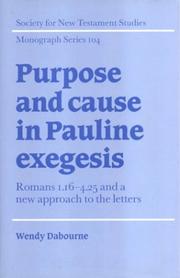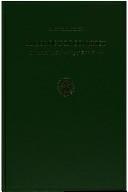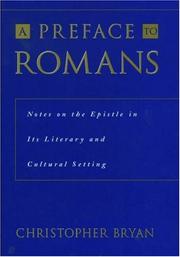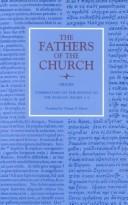| Listing 1 - 10 of 18 | << page >> |
Sort by
|
Book
ISBN: 083089912X 9780830899128 9780830829712 0830829717 Year: 2016 Publisher: Downers Grove, Illinois : IVP Academic, an imprint of InterVarsity Press,
Abstract | Keywords | Export | Availability | Bookmark
 Loading...
Loading...Choose an application
- Reference Manager
- EndNote
- RefWorks (Direct export to RefWorks)
In this volume of the Reformation Commentary on Scripture, Philip Krey and Peter Krey guide readers with care through a diversity of Reformation-era commentary on the second half of Paul's letter to the Roman church. Among the difficult issues addressed by were the predestination of God's elect, the destiny of Israel, the role of Gentiles in salvation history, the ethical demands of the Christian life, and the Christian's relationship to the state. Here, readers will encounter familiar voices and discover lesser-known figures from a variety of theological traditions, including Lutherans, Reformed, Radicals, Anglicans, and Roman Catholics. The volume draws on a variety of resources, including commentaries, sermons, treatises, and confessions, much of which appears here for the first time in English. Gathering together these Reformation-era reflections, it provides resources for contemporary preachers, enables scholars to better understand the depth and breadth of Reformation biblical commentary and aids the ongoing transformation of the minds--and lives--of people today.
Bible. --- 227.1*1 --- 227.1*1 Brief van Paulus aan de Romeinen --- Brief van Paulus aan de Romeinen
Book
ISBN: 9780567663887 0567663884 9780567663894 9780567663900 0567663892 0567663906 Year: 2016 Volume: 545 Publisher: New York Bloomsbury T&T Clark US
Abstract | Keywords | Export | Availability | Bookmark
 Loading...
Loading...Choose an application
- Reference Manager
- EndNote
- RefWorks (Direct export to RefWorks)
Robert Lewis examines Paul's use of the phrase "Spirit of Adoption" in Romans 8:12-17 against the background of its Roman Imperial context in order to shed light on interpretation of Paul's Letter to the Romans. Whereas other scholars have explored what Paul may have meant when he uses the term "adoption" Lewis instead explores the reasons behind Paul's coupling of it with the term "spirit". Having examined theories for a possible Jewish antecedent for Paul's use of this phrase, and found them less than persuasive, Lewis unlocks the data within the term's Roman Imperial context that significantly clarifies what Paul means when he uses the phrase "Spirit of adoption". Lewis shows that when Paul wrote his letter to the Romans, adoption had become a feature of Imperial succession. Roman religion gave a great deal of prominence to the Roman family spirit - the genius. The Emperor's genius became identified as a deity in Roman religion and its veneration was widespread in Rome as well as the provinces. When Romans 8.12-17 is read against this background, a very different kind of exegetical picture emerges
Adoption (Theology) --- Biblical teaching. --- History of doctrines. --- Bible. --- 227.1*1 --- Brief van Paulus aan de Romeinen --- 227.1*1 Brief van Paulus aan de Romeinen --- Mystical union --- God (Christianity) --- Fatherhood --- Adoption (Theology) - Biblical teaching. --- Adoption (Theology) - History of doctrines.

ISBN: 0521640032 0521018935 1107115973 0511171870 0511004974 0511149379 0511309627 0511487940 1280432330 051105131X 9780521640039 9780511004971 0511036086 9780511036088 9780511149375 9780511487941 Year: 1999 Volume: 104 Publisher: Cambridge Cambridge University press
Abstract | Keywords | Export | Availability | Bookmark
 Loading...
Loading...Choose an application
- Reference Manager
- EndNote
- RefWorks (Direct export to RefWorks)
Three factors prompt this re-examination of the underlying questions that shape mainstream exegesis of Paul's letters. Hermeneutical studies have destabilized assumptions about the nature of meaning in texts; the letters are usually characterized as pastoral but explicated as expressions of Paul's thought; and the impact of E. P. Sanders' work on Paul has sharpened exegetical problems in Romans 1.16-4.25. The outcome is a two-step method of exegesis that considers a letter first in the light of the author's purpose in creating it and second as evidence for the patterns of thought from which it sprang. The passage appears as pastoral preaching, helping the Romans to deal with the implications of the fact that the God of Israel is now accepting believing Gentiles on the same basis as believing Jews. Justification by grace through faith emerges as the theological understanding of God's action in Christ that grounds pastoral speech.
Bible --- Criticism, interpretation, etc --- Socio-rhetorical criticism --- 227.1*1 --- 227.1*1 Brief van Paulus aan de Romeinen --- Brief van Paulus aan de Romeinen --- Bible. --- Criticism, interpretation, etc. --- Socio-rhetorical criticism. --- Arts and Humanities --- Religion

ISBN: 9004061401 0585373388 9780585373386 9789004061408 Year: 1980 Volume: v. 53 Publisher: Leiden Brill
Abstract | Keywords | Export | Availability | Bookmark
 Loading...
Loading...Choose an application
- Reference Manager
- EndNote
- RefWorks (Direct export to RefWorks)
Bible --- Theology --- God --- Biblical teaching --- 227.1*1 --- -227.1*1 Brief van Paulus aan de Romeinen --- Brief van Paulus aan de Romeinen --- Metaphysics --- Misotheism --- Monotheism --- Religion --- Theism --- Bible. --- Theology. --- 227.1*1 Brief van Paulus aan de Romeinen --- Epître aux Romains (Book of the New Testament) --- List do Rzymian (Book of the New Testament) --- Roma-sŏ --- Római levél --- Romans (Book of the New Testament) --- Romasŏ --- Biblical teaching. --- God (Christianity) --- God (Judaism)

ISBN: 1280472456 0195351495 1423760417 9780195351491 9781423760412 9780195130232 0195130235 9781280472459 0197740480 Year: 2000 Publisher: Oxford Oxford university press
Abstract | Keywords | Export | Availability | Bookmark
 Loading...
Loading...Choose an application
- Reference Manager
- EndNote
- RefWorks (Direct export to RefWorks)
Christopher Bryan presents a commentary on St Paul's letter to the Romans from the standpoint of a literary critic. He questions the purpose for which the letter was intended and places the work in the context of first century culture.
Bible. --- Epître aux Romains (Book of the New Testament) --- List do Rzymian (Book of the New Testament) --- Roma-sŏ --- Római levél --- Romans (Book of the New Testament) --- Romasŏ --- Socio-rhetorical criticism. --- 227.1*1 --- Brief van Paulus aan de Romeinen --- Commentaries. --- 227.1*1 Brief van Paulus aan de Romeinen --- Criticism, interpretation, etc.

ISBN: 0813217369 0813212030 9780813212036 0813201039 9780813201030 9780813217369 0813201047 9780813201047 Year: 2001 Volume: 103-104 Publisher: Washington, D.C. Catholic University of America Press
Abstract | Keywords | Export | Availability | Bookmark
 Loading...
Loading...Choose an application
- Reference Manager
- EndNote
- RefWorks (Direct export to RefWorks)
Book
ISBN: 1299316948 1589837185 9781589837188 9781589837171 1589837177 Year: 2012 Publisher: Atlanta Society of Biblical Literature
Abstract | Keywords | Export | Availability | Bookmark
 Loading...
Loading...Choose an application
- Reference Manager
- EndNote
- RefWorks (Direct export to RefWorks)
Bible. --- Epître aux Romains (Book of the New Testament) --- List do Rzymian (Book of the New Testament) --- Roma-sŏ --- Római levél --- Romans (Book of the New Testament) --- Romasŏ --- Criticism, interpretation, etc. --- 227.1*1 --- 227.1*1 Brief van Paulus aan de Romeinen --- Brief van Paulus aan de Romeinen
Book
ISBN: 1282786466 9786612786464 9047443934 9789047443933 9789004179639 9004179631 Year: 2010 Publisher: Leiden Boston Brill
Abstract | Keywords | Export | Availability | Bookmark
 Loading...
Loading...Choose an application
- Reference Manager
- EndNote
- RefWorks (Direct export to RefWorks)
This book offers a fresh approach to Paul's gospel. Applying linguistic discourse analysis to Romans 1:16-8:39, it helps the reader to gain a comprehensive understanding of the argumentative structure and contents of the gospel of Paul. As well as revealing the two underlying descriptive frameworks that Paul uses to explain his gospel about God's salvation - the interactive framework between God and humans, and the 'two-realm' framework - this book demonstrates that Paul's gospel consists of one 'peak point' that shows the central role of Jesus, and two 'sub-peaks' elucidating salvation.
Greek language, Biblical --- Biblical Greek --- New Testament Greek --- Discourse analysis. --- Bible. --- Language, style. --- Theology. --- 227.1*1 --- 227.1*1 Brief van Paulus aan de Romeinen --- Brief van Paulus aan de Romeinen --- Discourse analysis --- Grec biblique --- Bible. N.T. Romans I, 16-VIII, 39 --- Language, style --- Theology
Book
ISBN: 9781628372397 1628372397 9780884143581 0884143589 9780884143598 0884143597 Year: 2019 Publisher: Atlanta SBL Press
Abstract | Keywords | Export | Availability | Bookmark
 Loading...
Loading...Choose an application
- Reference Manager
- EndNote
- RefWorks (Direct export to RefWorks)
The Greek word gar occurs 144 times in Romans and 1,041 times in the entire New Testament. However, many instances of this connective defy easy definition, and the English translation for is often inadequate, obscuring the clue that gar gives to the direction of the communicator's thought. In this ground-breaking work, Sarah H. Casson argues that gar offers vital guidance to the coherence of Romans. The book applies the cognitive approach of relevance theory to show how gar functions as an indispensable guide for tracing the significant points of Paul's argument, helping resolve questions about the coherence of sections, as well as smaller-scale exegetical problems. The work engages with key debates regarding the purpose of Romans and challenges some recent influential interpretations. Features include: an exegetically useful understanding of the connective gar; a new method for determining Paul's audience and reason for writing; a challenge to recent key debates and influential interpretations of the purpose of Romans. -- from book description, Amazon.com.
227.1*1 --- 227.1*1 Brief van Paulus aan de Romeinen --- Brief van Paulus aan de Romeinen --- Bible. --- Epître aux Romains (Book of the New Testament) --- List do Rzymian (Book of the New Testament) --- Roma-sŏ --- Római levél --- Romans (Book of the New Testament) --- Romasŏ --- Criticism, interpretation, etc.
Multi
ISBN: 9783110202175 3110202174 9786611993306 1281993301 3110209845 9783110209846 Year: 2008 Volume: 158 Publisher: Berlin ; New York : Walter de Gruyter,
Abstract | Keywords | Export | Availability | Bookmark
 Loading...
Loading...Choose an application
- Reference Manager
- EndNote
- RefWorks (Direct export to RefWorks)
Die Rede von Gott hat in der bisherigen Exegese des Römerbriefs kaum einen eigenen Gegenstand der Untersuchungen dargestellt. Die Studie widmet sich diesem zentralen Thema und weist in der textlinguistischen und rhetorischen Analyse wichtiger Texte des Römerbriefs auf, dass weder Jesus Christus noch die Anthropologie, sondern die Rede von Gott das entscheidende Argumentationsmuster im Römerbrief bildet. In der Frage des Primates der Christologie oder der Theologie und der christologischen Neubestimmung Gottes kann so eindeutig entschieden werden. Es wird auch der Frage nachgegangen, welchen theologischen Hintergrund die gesetzesfreie Heidenmission des Paulus hat. Dabei wird der alttestamentlich-frühjüdische Traditionshintergrund der paulinischen Darstellung aufgezeigt und mit einbezogen, um ein sicheres Fundament für die Beurteilung zu gewinnen, welche Position das paulinische Denken und sein Gottesbild im Spannungsfeld von Judentum und Christentum einnehmen und was es mit dem Selbstverständnis des Paulus auf sich hat.
God (Christianity) --- History of doctrines --- Bible --- Criticism, interpretation, etc --- 227.1*1 --- 227.1*1 Brief van Paulus aan de Romeinen --- Brief van Paulus aan de Romeinen --- Theses --- God --- Biblical teaching. --- Bible. --- Criticism, interpretation, etc. --- God (Judaism) --- Biblical teaching --- Epître aux Romains (Book of the New Testament) --- List do Rzymian (Book of the New Testament) --- Roma-sŏ --- Római levél --- Romans (Book of the New Testament) --- Romasŏ --- God (Christianity) - History of doctrines - Early church, ca 30-600 --- Epistle to the Romans. --- God. --- New Testament. --- Paul (Apostle).
| Listing 1 - 10 of 18 | << page >> |
Sort by
|

 Search
Search Feedback
Feedback About UniCat
About UniCat  Help
Help News
News